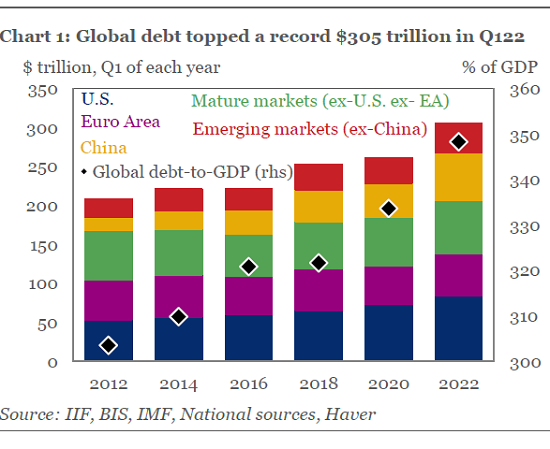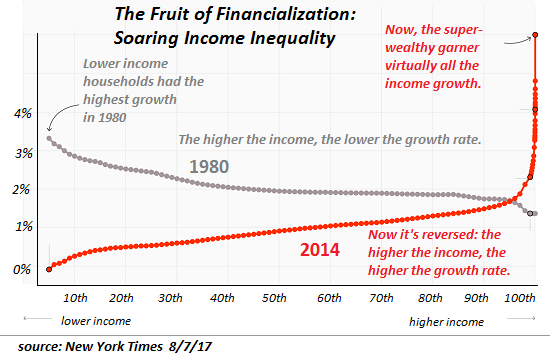The financial punditry is whipping itself into a frenzy about a Federal Reserve "policy error," which is code for "if the music finally stops, we're doomed!" In other words, any policy which reduces the flow of juice sluicing through the sewage pipes of the financial system (credit, leverage and liquidity--the essential mechanisms of financialization and globalization) endangers the entire rickety, rotten structure of phantom wealth that's enriched the few at the expense of the many.
The entire notion that central bank policy makes or breaks the economy is the original Policy Error #1.That is to say, whatever policy a central bank pursues is a policy error because every policy is an attempt to manipulate the self-organizing cycle of credit / economic expansion and contraction.
The history of central banking is actually quite simple:
- 1. Central banks act to protect the wealth and power of those who own / control most of the wealth. This is their core unstated reason to exist.
- 2. To justify this absurdly transparent protection of the elite in the eyes of the public, central banks go through the motions of trying to extinguish the business / credit cycle, that is, trying to eliminate defaults and credit crunches which are the frequent but low-intensity fires that burn up the financial deadwood.
This destruction of excessive credit, leverage and liquidity is necessary to protect the forest--the entire economy-- from a much larger, out-of-control conflagration.
Central banks sell this endless expansion of financialization to the public as "we're getting rid of those horrible nasty recessions that hurt all you little folk," but in letting the deadwood pile up ever higher, central banks are only guaranteeing the eventual conflagration will consume the entire forest.
This is basically what happened in 2008-09: the deadwood caught fire despite the best efforts of central banks and almost burned down the entire forest.
Anything that constricts the expansion of financialization (credit, leverage and liquidity) constricts the expansion of the phantom wealth of elites, and so central banks are loathe to limit credit expansion.Central banks and economists need a cover story for this dynamic, and so they purposefully call debt expansion "growth": hey, look, the economy is expanding, everybody's getting richer, our policies are working!
Nice, but this isn't reality. The reality is the top few get much, much richer than the little folk.That's the only possible output of financialization, which generates hyper-rewards for those few with the most expansive access to credit, leverage and liquidity: corporations, financiers and the super-wealthy.
Every policy that protects the deadwood is a policy error, which means every policy of central banks is a policy error. The one and only useful role of central banks is to be a short-term lender of last resort in financial crunches in which the deadwood catches fire and excessive credit, leverage and liquidity is consumed.
The deadwood burning greatly reduces the risk of the forest being destroyed, but some enterprises that are not overleveraged find that they're no longer able to roll over their short-term debt due to lenders cutting off lines of credit. A credit crunch can burn down otherwise prudent enterprises, and so central banks can protect well-managed businesses that need short-term credit by being the lender of last resort.
Credit panics don't last long. Loans of 90 days are typically enough to tide over those firms who need credit lines to function.
But instead of this limited role, central banks are always trying to expand credit, leverage and liquidity under the guise of "promoting growth". All that they're really doing is expanding financial deadwood by enabling the expansion of excessive waste and fraud. Thanks to central banks, the frivolous conspicuous consumption of the central-bank funded elite is glorified as "growth," along with the complete waste of planned obsolescence and speculative bubbles that generate the illusion of capital expansion.
Waste is not growth, and neither are the unlimited expansion of debt and speculative bubbles.Every policy of central banks is a policy error with the sole exception of short-term lending in standard business-credit cycles in which credit crunches cleanse the system of the deadwood of excessive credit, leverage and liquidity as a means of protecting the entire forest from destruction.
When $100 trillion in global deadwood-debt burns to the ground, that merely returns global debt to the levels of 2012. Central bank policies guarantee the forest will be consumed by an uncontrolled conflagration. That's the cost of claiming waste and debt are "growth" and protecting the phantom wealth of the few at the expense of the many.

